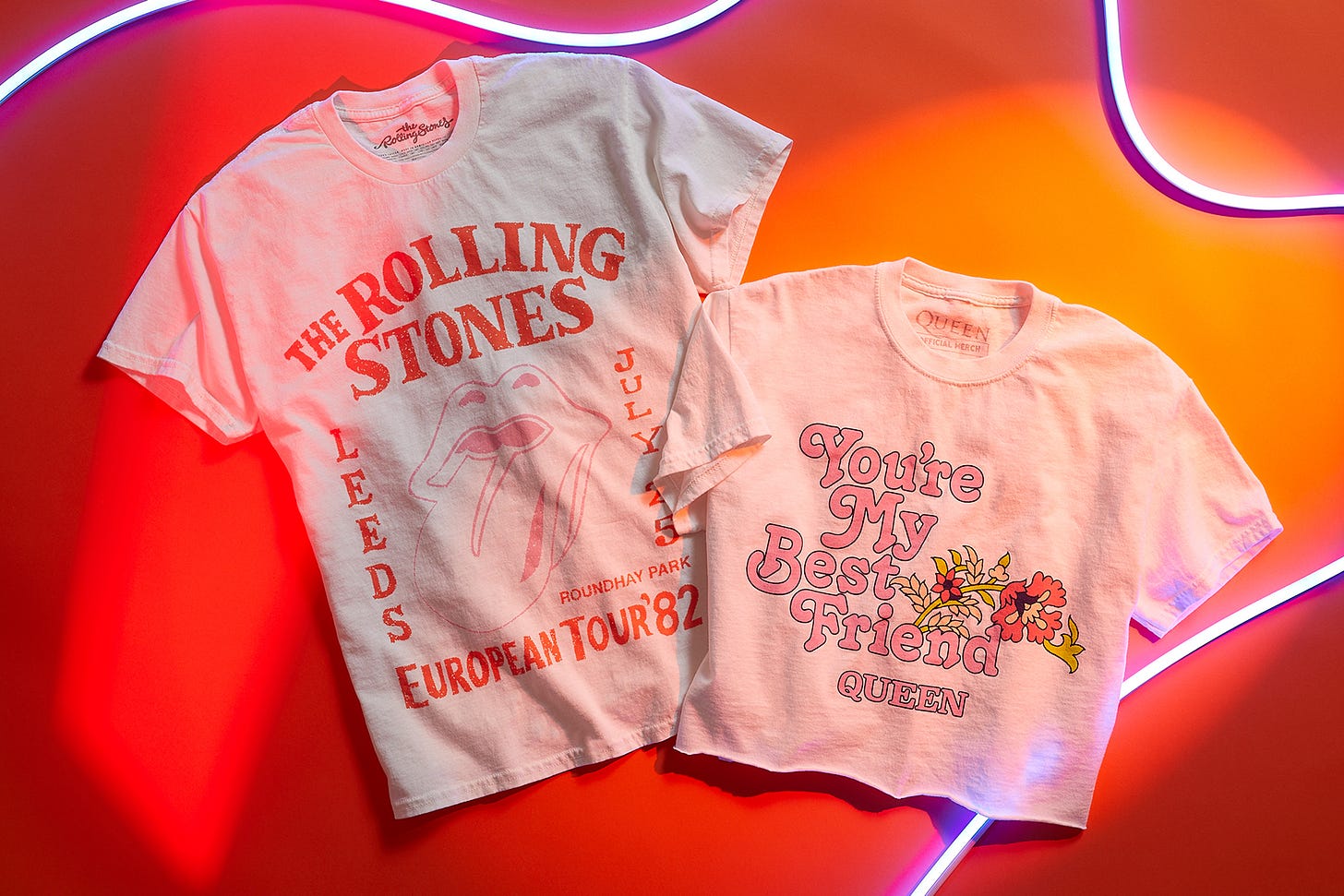Merch from Recording Artists is Still Big Business
It will always be fashionable to rock clothes showing your favorite band or artist.
A hoodie from Coachella. A t-shirt from Usher’s Past, Present, Future tour. Even as I type this article I’m considering buying something from Leon Thomas (still bitter that I missed his show in San Francisco.) Over the years millions of concert goers and music fans around the world always get sucked into buying artist merch. Perfectly positioned near the entrances and exits at venues and now readily available on artists’ websites, reselling platforms, and even Spotify, it’s another way to publicly display your favorite artist or brand, or that you were able to get tickets and attend a sold out show. Now that we have plenty of metrics that prove it’s a formidable revenue stream, the entire music industry has heavily investing in making sure consumers can get exactly what they want.
Brands regardless of price point should start considering partnering with artists more frequently. Consumers have a much deeper parasocial relationship with artists they grew up listening to, those that released an album during a special/memorable time in their lives, etc. The connection brands could leverage with these fanbases is undeniable. Plus, the global merch market is estimated to be worth $16B by 2030, so there’s a clear financial ROI. Even though this figure captures other merchandise like vinyls, signed posters, etc., apparel will still account for several billion.
Label Support
We’ve seen tons of examples of music labels taking advantage of younger artists over the years, but many have largely abandoned these practices, and the benefits that a label can provide are quite substantial. Within the last decade there have been plenty of acquisitions to allow these groups to enhance their merch selling capabilities across DTC/eCommerce, licensing and branding, and creating partnerships. Warner Music Group acquired German e-tailer EMP Merchandising; Sony Music acquired Probity and The Araca Group's music merchandise division, and also invested in boutique merchandiser Ceremony of Roses; and Universal Music Group acquired Fame House and Epic Rights. While many of these deals were for undisclosed amounts, the Warner Music acquisition of EMP was worth $180 million alone, so the potential ceiling for the total value of these combined deals could reach half a billion dollars. Post-acquisition, each label has optimized how to leverage these subject matter experts. Warner Music has folded EMP into a broader division called WMX. “The rebrand brings into focus important aspects of Warner Music’s value proposition to artists. These include a centralized in-house creative agency – bringing continuity and unity of vision across all aspects of an artist’s career. This encompasses special emphasis on merch and D2C, alongside long-standing expertise in streaming, vinyl, ticketing, fashion collabs, gaming, social, experiential, and other fan experiences.”1
Independent Artists
Those who decide to seek fame without the help of a label start thinking about merch much earlier. Streaming changed the game from a consumer standpoint, but it became much harder for these musicians to earn a living wage through music alone. Given their lack of resources, anything that can contribute to brand building and awareness is welcomed. Oakland-based DJ Lynda Negron (aka Negroni) already has it top of mind. “I know it might not make sense to sell an entire collection right now, but a few t-shirts and a hoodie with my logo would be perfect.” The silver lining is that music industry veterans are now stepping in to help. Global sensation Wyclef Jean launched an app last month called OpenWav to allow independent artists to better own the value chain and their fandom. Besides selling tickets, owning fan data, and streaming live shows, independent artists will also be given the tools to create and sell apparel within the app.
Legacy Musicians
The artists that have it the easiest are unfortunately no longer with us. Posthumously, the estates of greats like Michael Jackson and Whitney Houston have a massive merch arm. Since he was in love with fashion and had an entire team to create his outfits, Prince’s estate now offers several categories of clothes. Some are casual like your everyday activewear, but they also sell a designer line with pieces inspired by his award-winning 1999 album with price tags starting at $500.
Whether we’re talking about the old school crop top look or something more modern, consumers will always make space for artist merch in their wardrobe.
Warner Music Group; Warner Music Group Launches WMX, Offering Next Gen Services for Artists, Labels & Brands


